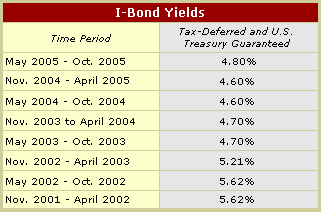Benson's Economic
& Market Trends
Keeping Your Stash in Cash
By Richard Benson
May 12, 2005
Risk is becoming a nasty four
letter word. Stocks are down for the year, junk bond holders
are lightening up as credit spreads widen, and it's likely that
GM and Ford won't be the only big issuers to see credit downgrades
now that the credit cycle has turned. Hedge Funds are also struggling
to see positive returns, commodities are well off their highs,
and even gold and silver stock investors have recently been taken
to the cleaners. Virtually every investor in almost every asset
class, who has placed bets, has suddenly discovered that they
are actually a losing speculator.
So, is anything offering a
positive return these days? Have we all forgotten about plain
old cash? Short-term interest rates are raised every six weeks
- the Federal Reserve has raised the yield on cash eight times
in a row! Moreover, with inflation in the CPI well entrenched
at over 3 percent a year, there is more tightening to do. Indeed,
unless there is a real market crash or the economy looks like
it is dead in the water, the Gods and the odds favor the yield
on cash rising. Each time interest rates are raised, the yield
curve flattens more like a pancake taking all of the easy profit
out of the carry trade. The markets are getting nervous, stock
prices are up and down like a yoyo, and volatility is back.
With over 40 percent of profits
at S&P 500 companies tied to financing activities, rising
interest rates can deflate this profit balloon. With the yield
on cash increasing, price volatility in the stock and bond markets
favor the down side of the market.
So who's making money these
days? My wife is! I gave up trying to persuade her to buy racy
investments like physical gold and silver; they're too volatile
for her. She simply wanted an investment that was safe and would
give her a return on her money, even if it barely kept up with
inflation. So, over the last few years she has purchased I-Bonds
which are sold directly
by the United States Treasury.
(I-Bonds pay a fixed interest
rate plus the CPI and taxes on the interest are only due when
the bonds are cashed in. There is no fee involved and you can
only buy $30,000 a year). Last
week, my wife showed me her investment returns since 2001 when
she first began buying I-Bonds. I was quite impressed.

(An I-Bond's composite earnings
rate changes every six months after its issue date. For example,
the earnings rate for an I-Bond issued in March 1999, changes
every March and September).
For those who just want to
save, keep up with inflation and assume no risk, cash or I-Bonds
are the best anyone can do. The reason is, since the NASDAQ had
its major decline in 2000, the Federal Reserve has been determined
to make sure there is no return on capital. They did this by
dropping short-term interest rates to an emergency 1 percent,
encouraging speculators to make risky trades, and by creating
an inflated housing market. This was their way to keep the economy
moving forward. Now, they are ever so slowly shifting the balance
towards savers and against the risk takers.
My tendency is to speculate
- being short stocks looks better than being long - and physical
gold and silver look good for long-term investment. However,
my wife keeps reminding me that risk-taking could mean lost principal.
As simplistic as this may sound, she instinctively understands
the power of compound interest. Slow, steady, and consistent
gains without losses, will almost always beat a portfolio with
volatility "because if you have a loss, you need a massive
gain just to break even."
More people are starting to
think and act like my wife! With the yield on cash going up,
the thought of being a saver with a guaranteed return is starting
to look attractive to more savvy investors. With stock prices
down for the year, retail stock investors, one by one, are realizing
they have been conned by Wall Street into believing they are
investing in stocks when, in reality, the middle class investor
is suckered into buying stocks at the top and they ultimately
end up holding the bag if the stock market tumbles. The markets
are looking mighty risky and even hedge funds don't know if there
is any real trend. You should start thinking about putting your
stash in cash because cash is no longer trash; it's King again.
May 11, 2005
Richard Benson
Archives
President
Specialty
Finance Group, LLC
Member FINRA/SIPC
2505 S. Ocean Boulevard
- Suite 212
Palm Beach, Florida 33480
1 800-860-2907
email: rbenson@sfgroup.org
Richard Benson, SFGroup, is a widely-published
author on securitization and specialty finance, and a sought after
speaker at financing conferences on raising equity for mid-market
companies.
Prior to founding
the Specialty Finance Group in 1989, Mr. Benson acted as a trading
desk economist for Chase Manhattan Bank in the early 1980's and
started in the securitization business in 1983 at Bear Stearns,
and helped build the early securitization businesses at Citibank
and E.F. Hutton.
Mr. Benson graduated
from the University of Wisconsin in 1970 in the Honors Program
in Math, and did his doctoral work in Economics at Harvard University.
Mr. Benson is a member of the Harvard Club of New York and Palm
Beach.
The Specialty
Finance Group, LLC is a Florida Limited Liability Company and
is registered with FINRA/SIPC as a Broker/Dealer.
321gold Inc

|